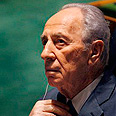
Peres - Confident in Obama
צילום: AP
Peres: Israel can bring peace to Middle East
On second day of UJC General Assembly President Peres tells participants Israel can play major role in resolving regional conflicts; says he is confident Israel-US relations will remain warm after change of administration
President Shimon Peres was the guest of honor on the second day of the United Jewish Communities' General Assembly, which conevened in Israel for the 77th time this week. Peres opened the first session of the day at the Jerusalem International Convention Center with a speech on Israel-US relations, peace in the region and Iran.
Speaking to a crowd of North American and Israeli Jews, Peres addressed the recent election of Barak Obama to US president, and said: "I have not the slightest doubt that the relationship between Israel and the US will be warm, profound and reasonable." Peres received warm applause when he told the audience that when Obama asked him what he could do for Israel, his reply was: "Be a great president for the United States."
Speaking about the peace process, Peres said that negotiations take time, but that as a democracy, Israel can play a vital role in bringing peace to the region. He also spoke of the Iranian nuclear threat, and stated that he was less concerned by the fact that the Islamic republic has nuclear weapons, than by its political ambitions. "They do not want a middle east of states, they want a middle east of religions," he said.
Over 3000 people are attending the four-day conference in Jerusalem, which opened Sunday. During the meet they will discuss various issues influencing Jewish life abroad, including the impact of the American presidential elections on relations with Israel, the global economic crisis, the state of philantrophic giving within the Jewish charitable network and ways to resolve the Middle East conflict.
The conference hosted Prime Minister Ehud Olmert in its gala opening Sunday, and is also scheduled to host such leading figures as Foreign Minister Tzipi Livni, Defense Minister Ehud Barak, and Likud leader Benjamin Netanyahu.
'Why should Jews support Arab causes?'
Monday was dedicated to a wide range of plenary sessions led by experts from Israel and abroad. One session of particular interest, which also drew a large crowd, was titled "Building a Shared Israeli Society: Challenges and Responses from Jewish and Arab citizens."One of the speakers was Amal Elsana Alhjooj, director of the Arab-Jewish Center for Equality, Empowerment and Cooperation (AJEEC). She discussed ways to improve the problem of inequality between Arabs and Jews in Israeli society, stressing that both sides were responsible for the current situation.. "We have to build a community and learn to deal with our internal issues" said Alhjooj about the Arab public. "We have to stand for ourselves and stop feeling that we're victims. We are not part of the problem, we are part of the solution."
Alhjooj also emphasized the importance of equal opportunity in education, because "education leads to employment, which in turn can solve social problems."
Mike Prashker, founder and director of the Institute for the Advancement of Shared Citizenship in Israel, supported her statments, and said: "I am a proud Jewish Zionist. But after 60 years of achievements, the Israeli nation must change this basic situation." He noted the strategies that should be implemented for that change to transpire, including equal funding for Arab insitutions and local authorities, and integrated schools.
He concluded by saying, "We can build a national society, a homeland for the jewish people which gives others equal citizenship."
One of the participants then asked the members of the panel why should Jewish philanthropists have to support Arab causes. Alhjooj replied by saying that unlike Jews, the Arabs did not have a tradition of philanthropy, and admitted that they also have the tendency to blame others for their problems. But, she added, if only a certain part of Israeli society should receive support from the Jewish communities abroad, then only this part will benefit. This, she said, will curb the process of building an Israeli society that does not exclude its minorities.










